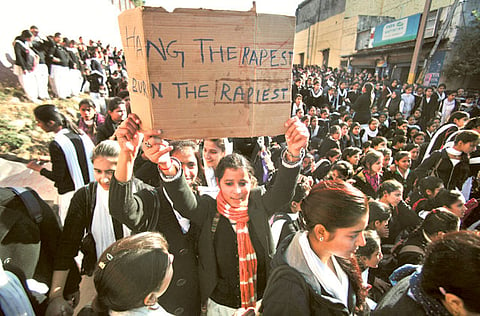Rising tide of sexual violence in India
Abuse of women a regular occurance as figures show rape cases more than doubled from 1990-2008

New Delhi: Despite an outpouring of anger at a student’s gang-rape, observers say misogyny remains widespread in India where sex assaults are often dismissed as “teasing” and victims find themselves blamed for attacks.
The Sunday night assault on a bus in New Delhi, which left the 23-year-old victim fighting for her life, has triggered nationwide revulsion and protests.
But campaigners say India has been slow and complacent in its response to what they call a rising tide of sexual violence against women.
Official figures show rape cases alone more than doubled between 1990 and 2008, though part of the rise could be attributed to better reporting.
“Our streets reflect an extreme misogyny,” Brinda Karat, a Communist Party lawmaker, told AFP.
“Women are objectified, harassed or sexually assaulted all the time, but no one does anything about it.
“Why should it take such a horrendous crime to wake us up to the fact that crimes against women keep increasing while conviction rates remain very low?”
National crime records show that 228,650 of the total 256,329 violent crimes recorded last year targeted women, with conviction rates for rape cases at 26 percent.
Campaigners say such figures are a direct consequence of a failure to tackle a culture in which sexual harassment is often dismissed as little more than a joke.
For example activists say “eve-teasing”, a phrase widely used to describe harassment ranging from obscene comments to molestation, obscures the depth of the problem and creates an impression that victims are only being “teased”.
There have long been complaints that police in India are dismissive of sexual harassment as a serious crime and campaigners have steadily attacked authorities for their lax and often insensitive response to victimised women.
An account published in the national newsmagazine “Tehelka” this month by a rape survivor illustrated the routine treatment of victims of sex crimes.
In it, a 23-year-old student at Delhi University recollected her ordeal, from the violent rape and beating to a brutal medical examination at a government hospital to a courtroom trial where she was questioned several times about the fit of her jeans and her “provocative” underwear.
Although Indian law requires that any rape victim be shielded from public view during a trial, no such screen was provided during her initial court appearances.
Her family received anonymous threatening phone calls every time she turned up in court. Last week, three years after the attack, her alleged rapist was cleared.
“Rape is a crime unlike any other. You have to live with your violated body, you have to live with the memory of what was done to you, and you have to live with the fact of your own helplessness,” she wrote.
In response to widespread fear among women of sexual harassment, trains in Mumbai and Delhi run segregated women-only coaches.
India’s top court directed all state governments last month to put female police officers in all public spaces including markets, parks, beaches and public transport.
A traditionally conservative country, India’s rapid economic growth has thrown open new job opportunities for women and increased their financial independence.
But activists say that many men see the trend as representing a threat to male dominance.
“Today we are seeing a real battle between a violent patriarchal mindset and a surge of empowered women who are very visible in urban India,” Hindol Sengupta, co-founder of Delhi-based non-profit Whypoll, told AFP.
“Female empowerment is totally unsettling to many men in this country, it has shaken up their sense of entitlement and their response is violent and volatile.”
Sign up for the Daily Briefing
Get the latest news and updates straight to your inbox

